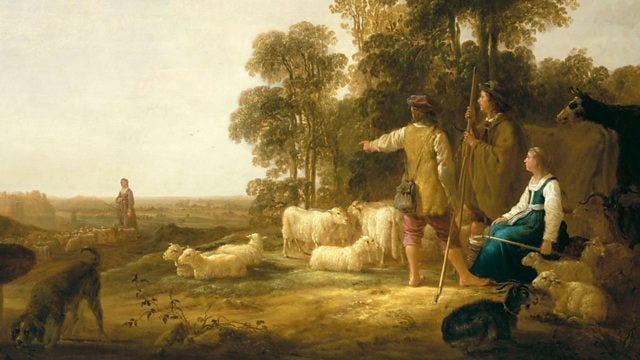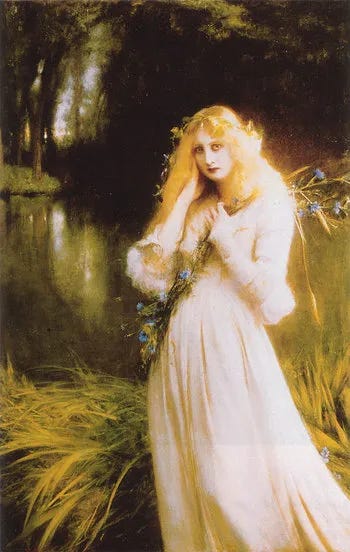What's in a name...
Yes, yes, I know I’m referencing a different Shakespeare play from the title, but it works for what I’m talking about today!
I’ve always been interested in the meaning behind names, especially since authors have been known to name characters based on what their names mean. I used to Google the meaning behind characters names in the books I was reading to see if there was any significance to them. In my early Tumblr days, I used to have a Name of the Day segment where I would, you guessed it, daily post names I had found and what their meanings were.
When I first read Hamlet I naturally had to search what the name Ophelia meant. We’d spent a bit of time in class talking about the meaning of the name Hamlet (and yes, having your name mean “village, home” is a bit weird (Think Baby Names). But the possibility of it being an homage to Shakespeare’s dead son Hamnet… Not what we’re talking about!), but we didn’t talk about what the name Ophelia meant. After a quick Google search, I learned that the name Ophelia means “help” (Nameberry).
It’s not a great meaning, if anything when I found out that the name Ophelia meant “help” it made me sad. This already tragic heroine who goes mad, who is physically assaulted by her lover, who’s death is seemingly witnessed without any attempt to save her, has a name that literally means “help” (Nameberry).
Despite the meaning and the tragic end to the character, it’s still a nice sounding name. Which of course had me asking more questions, like, did Shakespeare create it? It’s believed that Shakespeare created the name Jessica, and possibly the names Miranda, Olivia, and Imogen (though there’s debate about whether Shakespeare actually created those names or if he just popularized them), was Ophelia the same? It isn’t exactly a common name, authors have named characters Ophelia after Hamlet’s publication, but what about before?

In 1504 the Italian Renaissance poet Jacopo Sannazaro (1458-1530) named a character Ofelia in his pastoral poem “Arcadia” (Behind the Name). I tried to find out more about what this Ofelia’s role in the poem was and attempted to find an English translation of “Arcadia” but was unsuccessful, though I did find some digital bindings of it in Italian. If anyone has any information on where “Arcadia” can be read in English, I’d be very grateful!
While I don’t know what “Arcadia” is about, I know it’s an example of pastoral literature. According to Britannica, pastoral literature is a “class of literature that presents the society of shepherds as free from the complexity and corruption of city life” with heavy themes of “love and death” (Britannica). Pastoral literature “often presents the poet and his friends in the (usually thin) disguises of shepherds and shepherdesses” (Britannica). So while I wasn’t able to actually read “Arcadia,” I do have an idea of what may have happened in the poem.
It’s unclear if Sannazaro did indeed create the name Ophelia or if he rediscovered it and used it in his poem. Either way, a character named Ofelia is present (though what her role is still remains a mystery, probably a shepherdess based on what I now know about pastoral literature) in Sannazaro’s poem. A century later Shakespeare used the name in Hamlet. Shakespeare wouldn’t have been a stranger to pastoral literature, his own play As You Like It is an example of the genre (as a pastoral comedy), so it isn’t out of the question that he may have read or at least been aware of Sannazaro’s “Arcadia” and taken the name from that.
So now we have an origin of sorts, but what about the meaning? Well, we already know the name means “help,” but let’s really dissect it. The name Ophelia appears to be “derived from [the] Greek ὠφέλεια (opheleia)” which means “advantage,” (Behind the Name), “aid or benefit” (Very Well Family), as well as “succor, support” (Oh Baby Names). These sources reveal that the name Ophelia doesn’t mean “help” in the sense of asking for or needing help, but actually implies more of a person in a “helper” role, someone who aids or assists others.
As one of two women characters, Ophelia is known for her obedience towards the male characters in the play. As Amanda Cloud explains in her article “Gender Roles of Women in the Renaissance,” renaissance women “were supposed to be seen and not heard…Women were to be prim and proper…their thoughts and ideas were shaped by men. Mostly everything women did had input given by men,” (Cloud). While Ophelia isn’t a member of the royal family, she has some nobility and can be considered a woman of upper class. However, much of the same expectations were still expected of upper class women, even though many “had servants and workers working for them…the women were still expected to take care of the house hold,” and they also couldn’t “live alone if they were not married. If a woman was single, she was made to move in with one of her male relatives or join a convent and become a nun” (Cloud).
Shakespeare’s Ophelia checks off many qualities of a good renaissance woman as described by Cloud. She is obedient and seen instead of heard, her thoughts are shaped by the men in her life, most notably by her brother Laertes and father Polonius (whom she lives with as a single woman) who in Act I scene iii repeatedly tell her to ignore Hamlet’s advances (since Hamlet is well above her class) and, of course, Ophelia obeys them. She obeys her father again when she is “loosed” by him in Act III scene i to discover if she is the cause of Hamlet’s madness, and in that scene Hamlet assaults and cruelly reminds her of what her role is. She could either marry and she could “Get thee to a nunnery” or become a “breeder of sinners” because there were no other options for a single woman such as herself (Act III scene i line 121, 122). Or, of course, there is another secret option. Madness, but that’s worth a post all it’s own.
While Ophelia possesses many qualities of a typical renaissance woman, does she fit her name and it’s meaning of help? That’s harder to discern, mostly because Shakespeare is known for having very little stage directions, and just from reading the play we don’t see many examples of her as a helper. We see her helping Gertrude and Claudius at the urging of her father in Act III scene i to prove whether or not Hamlet’s love for her is the cause of his madness. She’s with her brother Laertes in Act I scene iii as he prepares to leave for France, and some productions have her assisting Laertes in packing before his departure. I don’t know that any of these examples really mark Ophelia as a helper, and if they do it isn’t necessarily in a good way. More can be shown on stage with direction of how an actress may portray Ophelia and how a Director may want the character to be shown, though generally in productions Ophelia is shown to be a passive, obedient character who fits the role of a renaissance woman near perfectly. It wouldn’t be a stretch for stage productions to be able to show Ophelia as a helper, in whatever way that means. Possibly helping Laertes pack, or taking a characters coat/robe when they enter, more can be done on stage to show Ophelia in this role than is actually told to reader’s in the text.
All of this of course just goes to show the intricacies of a name, how they come to be and how some characters fit or don’t fit the names they are given, and how name meanings can change. While I’m happy to have learned that the name Ophelia means “help” as in a “helper,” I can’t help but wonder if the character’s own tragic ending has changed the meaning to mean “help,” as in, needing assistance. It’s possible that a helper can also need help, and Ophelia is arguably a character who needed someone to help her, someone to listen to her or at least allow her a space to be heard. She gets that briefly in Act III scene i, and greater in madness with little to show for it except a watery grave, known forever for her death. Ophelia, who needed help.
Sources:
Ahlin, Charlotte. “10 Popular Baby Names Invented by Authors.” Bustle, Bustle, 26 Feb. 2016. https://www.bustle.com/articles/144442-10-popular-baby-names-invented-by-authors.
“Arcadia : Sannazaro, Jacopo, 1458-1530 : Free Download, Borrow, and Streaming.” Internet Archive, Milano :Società Tipografica De'Classici Italiani, 1 Jan. 1970, https://archive.org/details/arcadia1806sann/mode/2up.
“Arcadia Del Sannazaro.: Sannazaro, Jacopo: Free Download, Borrow, and Streaming.” Internet Archive, Manuzio, Aldo, 1449 or 50-1515, 1 Jan. 1970, https://archive.org/details/ita-bnc-ald-00000018-001/mode/2up?view=theater.
“The Arcadian Poet: Jacopo Sannazaro.” Omeka RSS, Warpurg Institute, https://omeka.warburg.sas.ac.uk/exhibits/show/the-invention-of-poetic-landsc/the-arcadian-poet--jacopo-sann#:~:text=Arcadia%20is%20compounded%20of%20twelve,sport%2C%20music%20and%20beautiful%20landscapes.
Campbell, Mike. “Meaning, Origin and History of the Name Ophelia.” Behind the Name, https://www.behindthename.com/name/ophelia.
Cloud, Amanda. “Gender Roles of Women in the Renaissance.” Gender Roles of Women in the Renaissance, Cedarcrest.edu, http://www2.cedarcrest.edu/academic/eng/lfletcher/shrew/acloud.htm#:~:text=These%20women%20were%20expected%20to,care%20of%20the%20house%20hold.
Dagnan-Bouveret, Pascal Adolphe Jean. Ophelia. 1900, Christie's, Anonymous sale; Christie's, New York, 23 April 2002, lot 117.
Dickens, Donna. “17 Famous Characters with Hidden Meanings in Their Names.” BuzzFeed, BuzzFeed, 5 Nov. 2013, https://www.buzzfeed.com/donnad/famous-characters-with-hidden-meanings-in-their-names.
The Editors of Encyclopaedia Britannica. “Pastoral Literature.” Encyclopædia Britannica, Encyclopædia Britannica, Inc., https://www.britannica.com/art/pastoral literature.
“In Our Time, Pastoral Literature.” BBC Radio 4, BBC, 6 July 2006, https://www.bbc.co.uk/programmes/p003c1cs.
Lord, Oh, et al. “Words Shakespeare Invented.” No Sweat Shakespeare, 21 Feb. 2021, https://nosweatshakespeare.com/resources/words-shakespeare-invented/.
“Ophelia.” Nameberry, Nameberry, https://nameberry.com/babyname/ophelia.
“Ophelia.” Oh Baby! Names, Oh Baby! Names.com, https://ohbabynames.com/all-baby-names/ophelia/.
“R/Todayilearned - Til Shakespeare Invented the Names Miranda, Jessica, and Olivia.” Reddit, Reddit, 2015, https://www.reddit.com/r/todayilearned/comments/3o3rj8/til_shakespeare_invented_the_names_miranda/.
Shakespeare, William, and A. R. Braunmuller. The Tragical History of Hamlet Prince of Denmark. Penguin Books, 2016.
Wisner, Wendy. “What Does the Name Ophelia Mean?” Verywell Family, Verywell Family, 4 Aug. 2021, https://www.verywellfamily.com/ophelia-name-meaning-origin-popularity-5191519#:~:text=The%20name%20Ophelia%20is%20an,in%20his%20play%20%E2%80%9CHamlet.%E2%80%9D.


